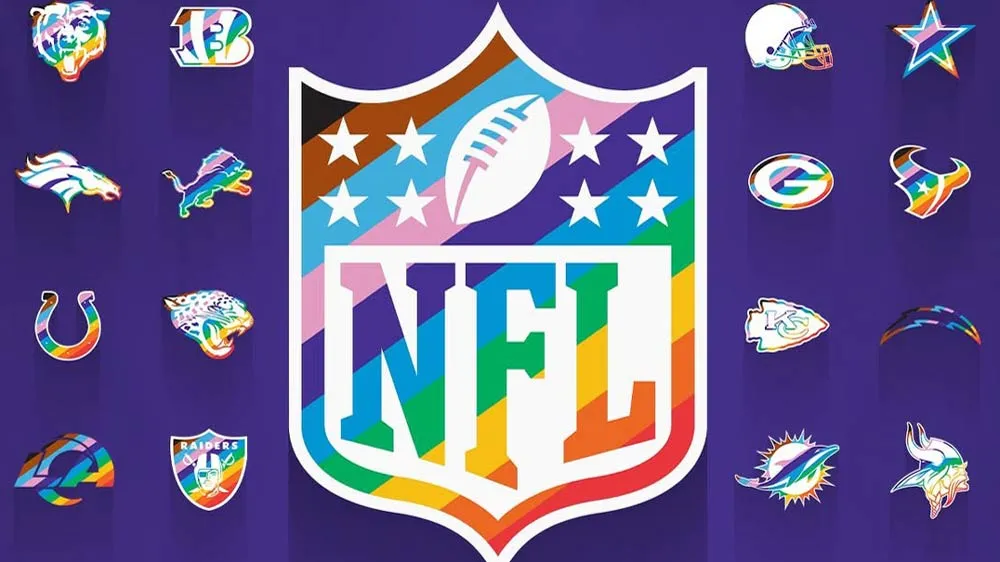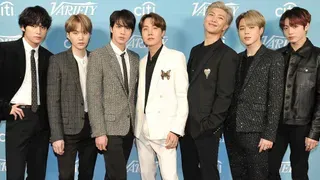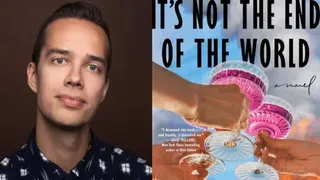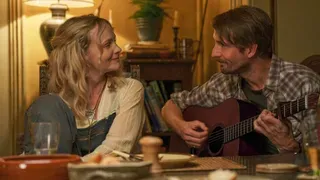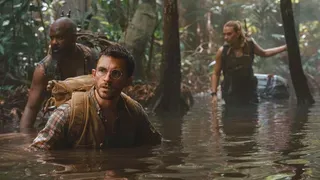April 20, 2008
Gray zone
Michael Wood READ TIME: 4 MIN.
With Meadowlark, a young filmmaker explores notions, nuances of morality.
Young, independent filmmakers face a lot of intimidating prospects: tight budgets, caustic critics and the daunting task of identifying a truly original idea, to name a few. But confronting the man who killed your brother?
That's the kind of experience few would seek, and fewer still would film. Yet with Meadowlark, a documentary making its world premiere at Independent Film Festival Boston 2008 (IFF Boston), 27-year-old openly gay director Taylor Greeson has done just that. The film follows Greeson on a journey to rediscover his past, particularly the pivotal summer of 1993, when his brother, Charlie, was stabbed to death. At the same time Greeson, a young boy raised in the Mormon faith, was coming to terms with his sexuality in the arms of an older lover.
"When you say you're going to explore these events, everybody is a little mystified as to why you'd bring up things and talk about events that most people would like to keep in the past," Greeson admits. He says that knowing thyself was the ultimate impetus. "After a lot of soul searching, I discovered that... I needed to go back and explore these events a little more deeply."
Meadowlark invites viewers on this road trip down Unwelcome Memory Lane. Greeson, who now resides in Los Angeles, returned to his childhood stomping grounds in Montana to re-examine the incidents surrounding his brother's death, the ramifications of the loss on his life and those of his family members, and to come face to face with Charlie's killer - a former tattoo artist named Frank Fuhrmann - behind the high, guarded walls of a state correctional facility.
He also reconnected with his "first boyfriend" Mike, an older teenager and boarder in Greeson's childhood home with whom the future filmmaker began a sexual relationship at age 12.
The film's format, a nostalgically narrated, carefully woven tapestry of old family photos and new interviews, is nothing new in documentary moviemaking. But what's interesting about Greeson's approach is his unwillingness to paint any individual, even his brother's murderer, with simple, incriminating brush strokes; he spends much of the film trying to find forgiveness for Fuhrmann, and much of the rest explaining how his relationship with Mike transcended simple, black and white depictions of molestation.
Both attempts have been met with mixed reactions from outsiders.
"My sister was mostly angry... and my mother viewed it as a chance to retry him," recalls Greeson of his family's reaction when he told them he would be giving face time to his brother's killer, who maintains that his crime was an accidental one (a dubious claim, given the evidence presented). While Greeson hoped meeting Fuhrmann would move him closer to forgiveness, it instead helped him negotiate a different definition of the word.
"I think I define 'forgives' as something different than I originally thought," says Greeson of the outcome. "Maybe forgives is not to absolve the person completely, but a desire to see them suffer less."
"I think I've come a lot closer to that."
Even more controversial is the charity Greeson's extends to his relationship with Mike. While conventional wisdom and traditional social mores would incriminate anyone having sexual relations with a minor, Greeson still bears tender feelings for Mike and disagrees with assertions that molestation is a black and white issue.
"I had printed out a description of the film [for a screening]," says Greeson of controversy he's courted with his perspective. "I described the event as, 'At the age of twelve, he lost his virginity to an older man.' The printer actually refused to print it unless it said, 'he was raped by an older man.'"
"It's not a clear cut case of a person being a monster," says Greeson. "It's a far more complex issue... As a twelve-year-old boy, I already knew I was gay so I had feelings for men. This [the relationship with Mike] felt really good; it felt good physically and emotionally. Was I old enough to understand all those emotional and physical feelings? No, probably not. But I can't help but look back at them with some fondness."
Greeson hopes that members of the LGBT community will relate to his nuanced perspective.
"Anyone who has a child has very strong feelings of protectiveness," says Greeson. "I could understand why anybody would take offense at this being described as anything other than rape or molestation. But one of the goals of the film is to crack open this debate, and about how events are far more complex than they seem from the outside."
In examining both pivotal experiences in Greeson's life, his brother's murder and his first gay experience, Meadowlark does succeed in forcing viewers to re-examine their own attitudes towards forgiveness, incrimination, and the grayer areas of morality. However, the film could have benefited by examining how these life-changing events intersected over the course of a single summer, rather than treat them as parallel but unconnected experiences. For example, the film fails to ask the single most obvious question: while Greeson's relationship with Mike may have been initiated by his own agency to sate sexual curiosity, was it also bolstered by the desire of a young boy, in the wake of his brother's brutal death, to find solace in another "older brother" figure?
"I'm trying to grow as a filmmaker, so there are obviously things about the film that I feel ... if I made it ten years later, with more experience, it would better help me realize my goals," says Greeson. But as catharsis, and as film, his work still succeeds.
"I've grown a lot as a person," he says. "I hope that's apparent in the film, and that people feel invited to experience that with me."
Meadowlark has its world premiere at the Somerville Theater in Davis Square as part of the 2008 Independent Film Festival Boston on Thursday, April 24 at 10:30 p.m; second show on Saturday, April 26 at 8:00 p.m. For information on tickets and other IFF Boston shows, visit www.iffboston.org.
Michael Wood is a contributor and Editorial Assistant for EDGE Publications.
